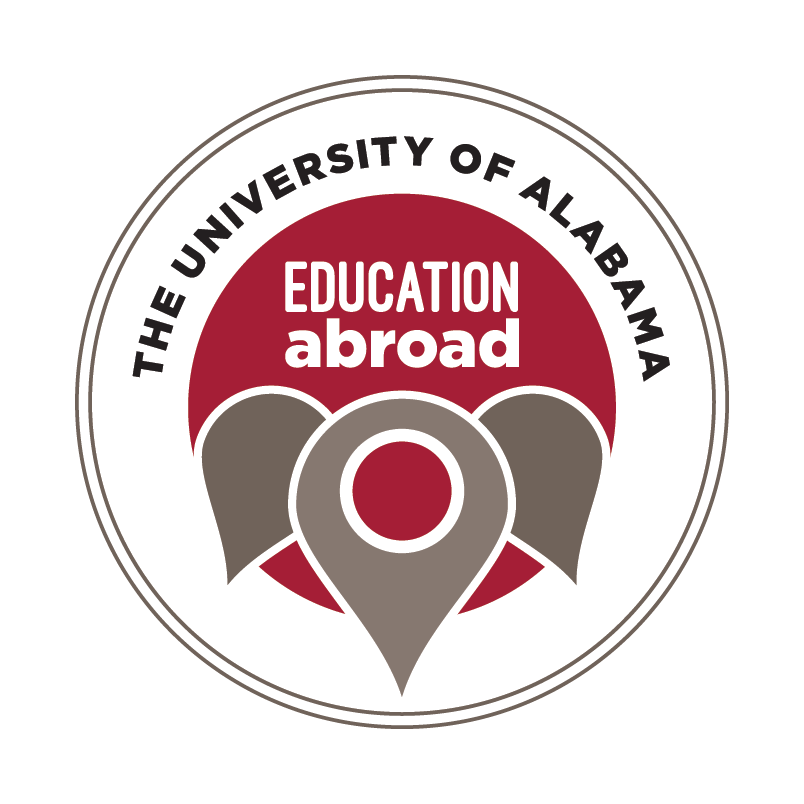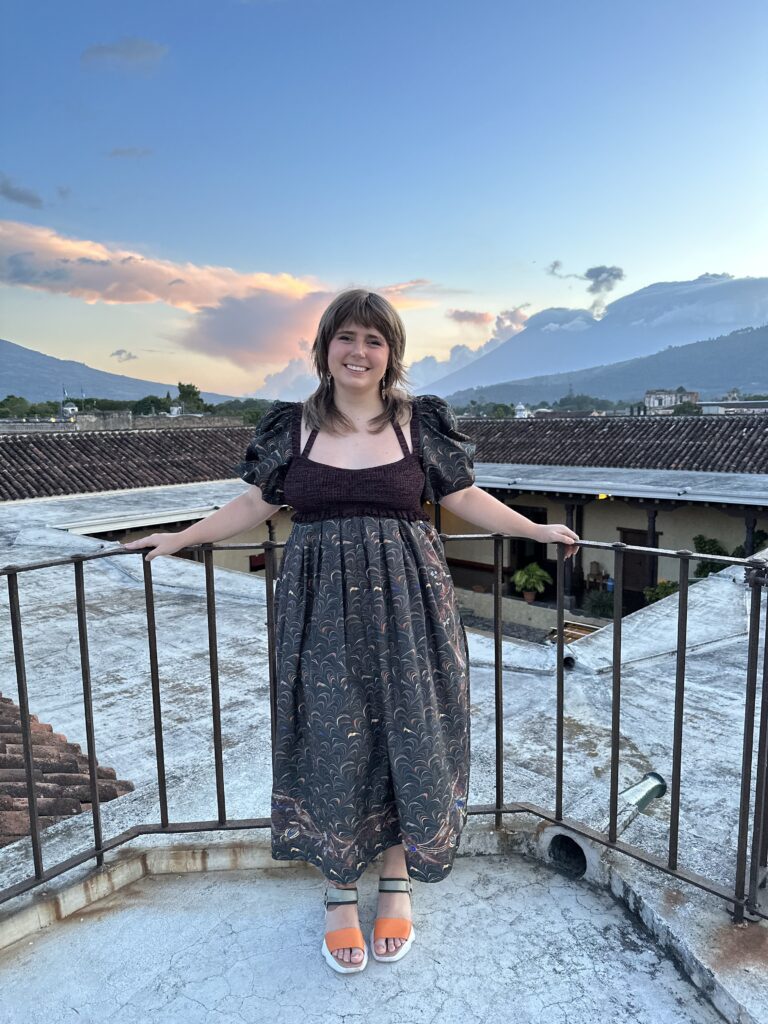
One of the main reasons I chose to study abroad in Antigua, Guatemala is the course content offered within my program. I am on a faculty led trip taught by Dr. Chris Hale, an amazing professor from the political science department. I am taking PSC 331: Politics of Developing Nations and PSC 332: Politics of Latin America. I have learned so much about Latin America, specifically Guatemala, where I am able to see components of the course material unfolding in real time. In this post, I want to focus on what I have been learning, and what my schedule looks like on days I have class.
Every morning, we have breakfast at 8:00 AM, prepared by the cooking staff at Casa Herrera. My favorite breakfast is fried eggs, black beans, and plantains with a glass of papaya juice. Casa Herrera is a 17-th century colonial house owned by the University of Texas. It is massive, complete with lecture halls, classrooms, office spaces, a kitchen, dining rooms, multiple living quarters, a student lounge, courtyards, and even a rooftop terrace. I am living, eating meals, and taking my classes here! Every day, I go up to the terrace to look at the volcanoes and work on embroidery! We have free time in the morning to explore the city and study. Guatemala is in its rainy season, and it storms in the afternoons, so the schedule works out perfect! Sometimes, I go to the market and look for gifts and handmade jewelry made by local Mayan woman. I spent some mornings visiting museums and others finding new coffee shops.
The whole group meets back at “Casa” at noon for lunch. Some students are staying at a nearby hotel because Casa Herrera only sleeps nine students. Lunch is typically light, but always delicious! Most of our meals are traditional Guatemalan cuisine, but every once in a while, we have sandwiches or chicken breast. After lunch, we have a few minutes to get our things together before class at 1:00. I like to hang out in the girl’s room because we have our own second floor lounge!
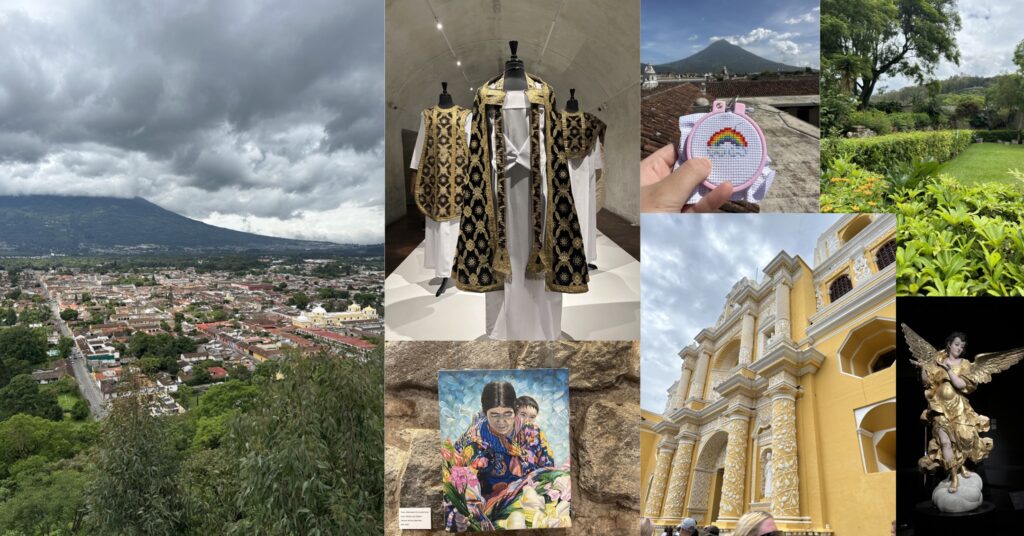
1. Overlook at Cerro de La Cruz
2. Traditional Funeral attire at MUNAG – Museo Nacional de Arte de Guatemala
3. Cross-stich project on top of terrace at Casa Herrera
4. Gardens at Convento de La Merced
5. Painting of Mayan woman and child at Antigua Colegio de la Compania de Jesus
6. Elaborate design of Convento de La Merced
7. Post-Colonial statue at MUNAG – Museo Nacional de Arte de Guatemala
We have class about four or five times a week, depending on the excursions we are going on. On the days we do have class, it goes from about 1:00 to 5:00, with a break in between 331 and 332. Dr. Hales classes are probably the most interesting political science courses I have taken so far. In Politics of Developing nations, we learn about different theories of development, specific deep dives into various developing nations, and the economics behind development. I usually do not understand economics, but Dr. Hale teaches us the concepts like a story. Not only is the information easy to follow, but I am actually excited to know what comes next.
In Politics of Latin America, we get to learn about the political, economic, and social history of various countries in Latin America. We focus specifically on Guatemala, Cuba, Chile, Mexico, and Brazil. We learned about the countries in context of colonial times to present day. The most interesting part of this class was learning about the current election in Guatemala. Guatemala is in the process of their 2023 presidential election, which has been highly contested and riddled with controversies. Five days after we arrived, a Guatemalan court ordered the Semilla (center-left) party to be barred from the race. Semilla’s candidate Bernardo Arévalo was in second place after the runoffs, so supporters took to the streets to protest. The entire election season has consisted of candidates being kicked out of the race, so tensions were tight when we arrived. The election was certified on the 13th, and the court decision removing Bernardo Arévalo was rejected. Regardless, political tension is still high in Guatemala, protests continue to happen, and it is clear there is a distrust of Guatemala’s democracy from its constituents.
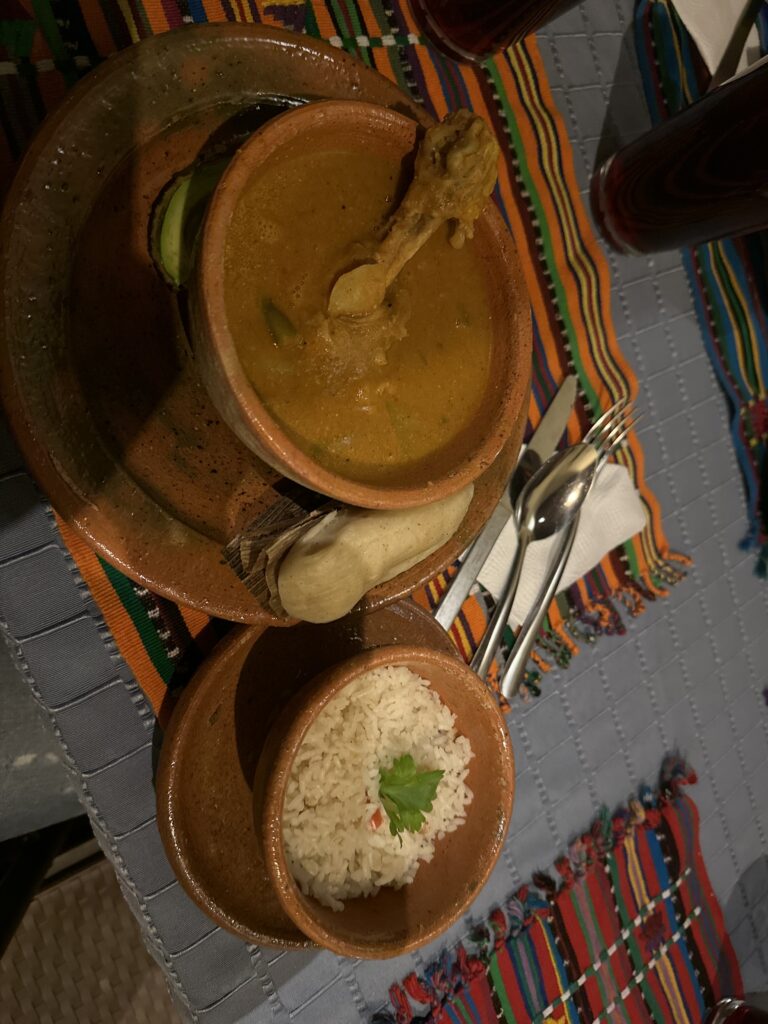
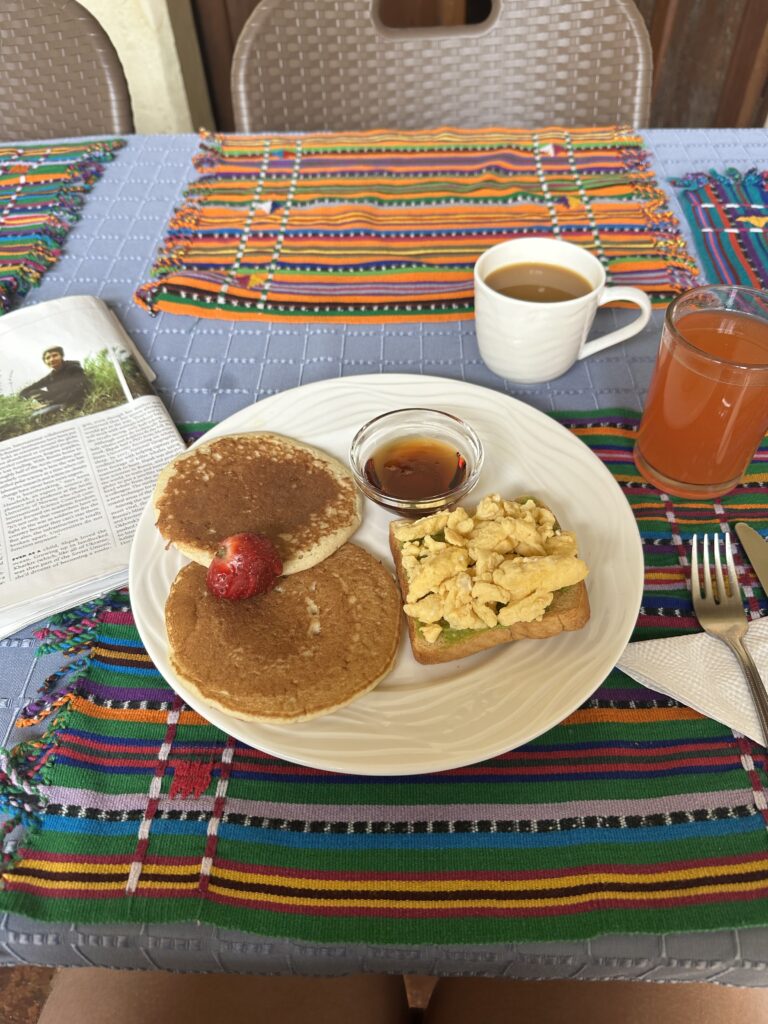
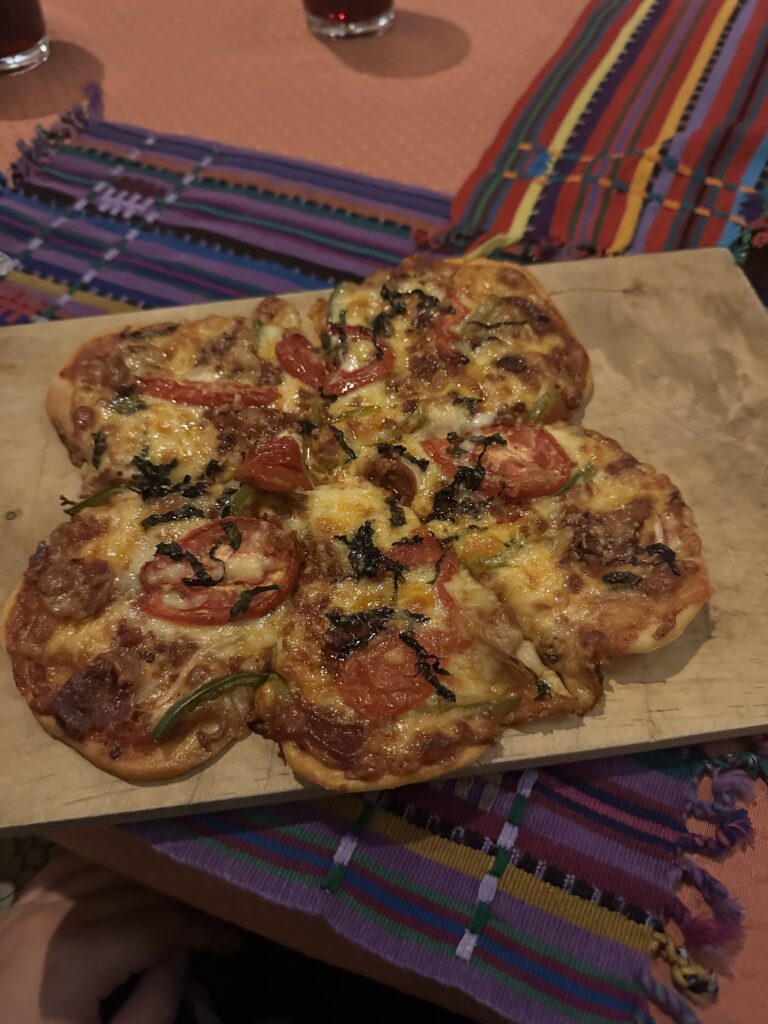
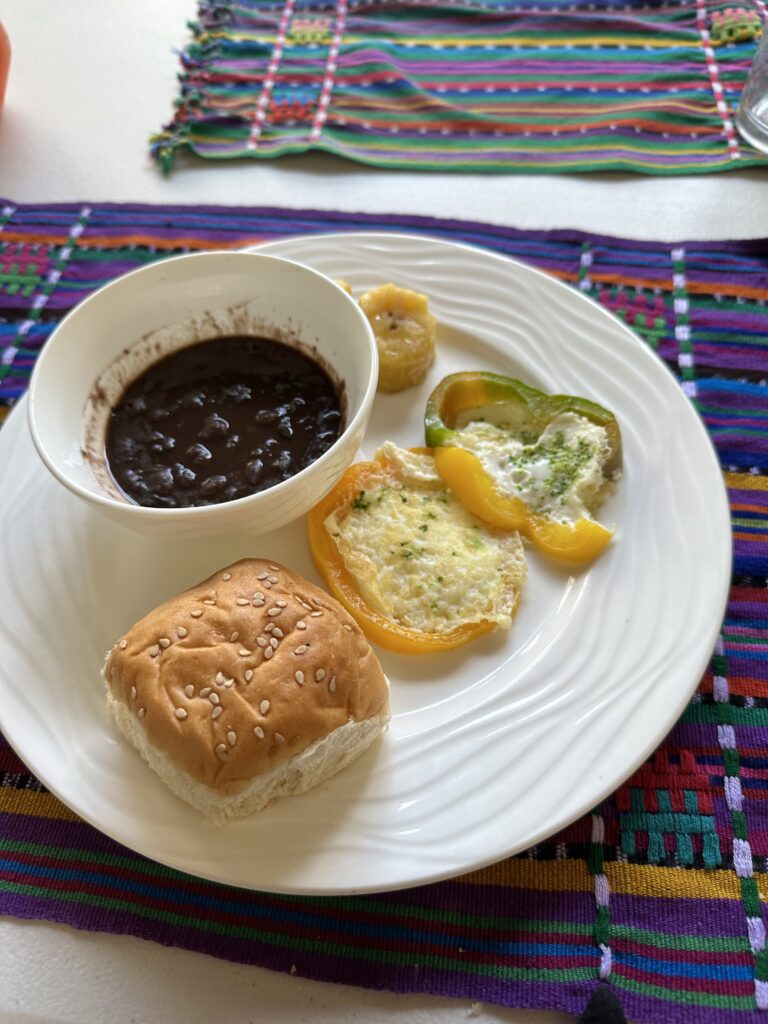
After class, we have about two hours of free time till dinner. We use this time to explore and work on our group projects. Both classes consist of a midterm, final, and group project. Me and six other students are working together to create two policy memos to present to the class at the end of the program. First, we have to develop an economic plan to assist Mexico out of its 1995 financial crisis. Our second project consists of developing an economic and political plan to guide Cuba out of its 1991 crisis. We get to pretend we are creating policy during the time period and bring our own ideas to the table. Applying the concepts we have learned in class to our projects helps me understand the ends and outs of the course material.
For dinner, we have different traditional Guatemalan meals. There are a lot of stews, rice, beans, tamales, and more! My friend Ayana bought Tajin at the beginning of the trip, and we have been using it on everything. To remind us of home, we even got to build our own pizzas for one dinner. After dinner we often relax and hang out as a group. Sometimes we play cards, walk around the city, or catch some live music just down the street. The best part about Antigua, besides the amazing weather, is that everything is less than a ten-minute walk away! I sometimes stop at the bodega across the street and get my favorite Taki potato chips, which I’ve never seen in America before.
Thanks for tuning in to my daily schedule in Guatemala, come back for more posts about our excursions, trips, and cultural experiences!
